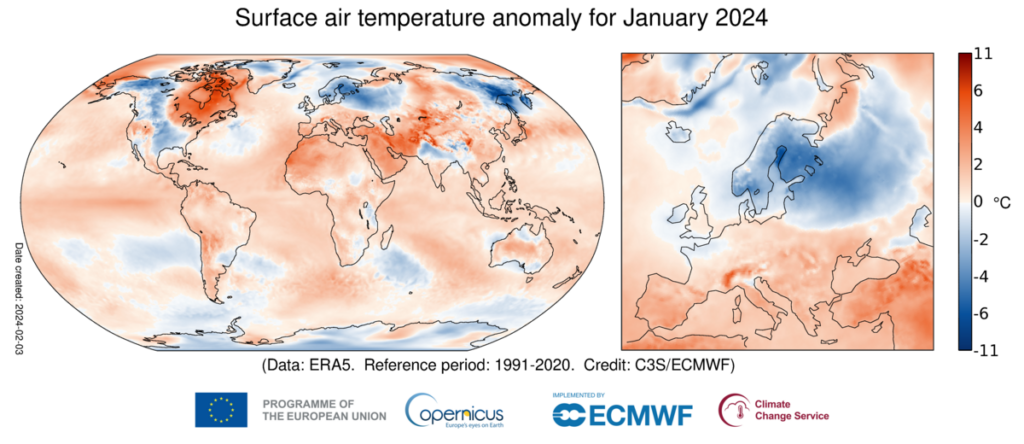As we step into 2024, we are potentially stepping into the hottest year on record in over 120,000 years. This is not just a prediction, but a projection based on scientific data and climate models.
The Rising Temperatures
The National Oceanic and Atmospheric Administration (NOAA) predicts a 22% chance that 2024 will break 2023’s record as the hottest year. The global average temperature for July 2023 was the highest on record and likely for at least 120,000 years. The warmth of the oceans plays a significant role in this increase, with ocean temperatures at or near their peak.
According to the Copernicus Climate Change Service (C3S), implemented by the European Centre for Medium-Range Weather Forecasts on behalf of the European Commission with funding from the EU, January 2024 was the warmest January on record globally, with an average ERA5 surface air temperature of 13.14°C, 0.70°C above the 1991-2020 average for January and 0.12°C above the temperature of the previous warmest January, in 2020.

The Role of the Oceans
The oceans, covering 71% of the planet, absorb most of the excess heat from global warming. The warmth in the oceans helps control the atmosphere and supercharges wild weather. Record heat in the Atlantic Ocean in the northern hemisphere, which began rising before El Niño, is also blamed for pushing world temperatures higher last year.
The Impact of El Niño
El Niño, a phase of a natural cycle in the Pacific Ocean that brings warmer water to the region along the equator west of South America, weakens trade winds and redistributes ocean heat to the north and south. Its intensity over the coming months is expected to be key in adjusting the world’s thermostat.
The Future of Our Climate
If climate factors are the same as in the past, Earth is already committed to another 7 degrees or so (about 4 degrees Celsius) of warming over the next few thousand years1. However, it’s important to note that in the past, it wasn’t humans messing with the atmosphere.
Conclusion
The rising temperatures and the potential of 2024 being the hottest year on record serve as a stark reminder of the urgency for ambitious efforts to reduce global greenhouse gas emissions. The long-term warming trend is driven by continued increases in concentrations of greenhouse gases in the atmosphere. As we face this reality, it’s crucial that we take collective action to mitigate the impacts of climate change.
Let’s remember, the choices we make today will determine the climate of tomorrow. The time to act is NOW!.
Resource:
- weather.com
- UN News | It’s official: July 2023 was the warmest month ever recorded
- Climate Copernicus | Copernicus: In 2024, the world experienced the warmest January on record
